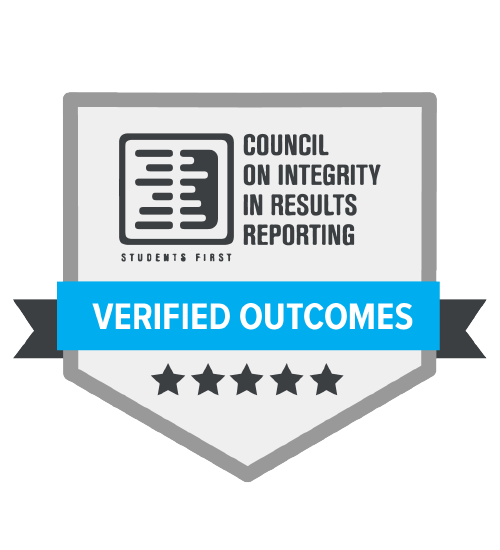Choosing a Coding Bootcamp: 5 Factors to Consider
By Tech Elevator Admissions Lead, Kalyn Breneman
 If you’re reading this article, chances are you’ve already heard about the secret “backdoor” into tech: coding bootcamps. But these fast-paced programs offer more value than just a foot in the door; they can often help you secure a job faster and at a higher pay rate than the traditional route of a four-year degree or self-teaching.
If you’re reading this article, chances are you’ve already heard about the secret “backdoor” into tech: coding bootcamps. But these fast-paced programs offer more value than just a foot in the door; they can often help you secure a job faster and at a higher pay rate than the traditional route of a four-year degree or self-teaching.
For example, according to SwitchUp—an organization that provides unbiased information to aspiring coding bootcamps students—four of the best bootcamps in its research had in-field employment rates of at least 80% within a year of graduating. This figure is higher than even well-known computer science programs from the likes of Stanford (61%) and MIT (56%).
Coding bootcamps are clearly a worthwhile pursuit, but not all bootcamps are created equal…so which one should you attend?
The choice can be tough, especially when you’re not exactly sure how to judge a bootcamp’s quality and overall value. We dig into the key aspects to assess whether a coding bootcamp will be a good fit for you in the points below.
5 Factors to Consider When Choosing a Coding Bootcamp
1. Job Placement Rate
 One of the biggest draws of coding bootcamps is how quickly you can switch from any career into the tech field. Naturally, you’ll want evidence that showcases a bootcamp’s ability to deliver on this benefit. Enter the job placement rate.
One of the biggest draws of coding bootcamps is how quickly you can switch from any career into the tech field. Naturally, you’ll want evidence that showcases a bootcamp’s ability to deliver on this benefit. Enter the job placement rate.
The job placement rate indicates how successful a program is at helping its students secure employment after graduation. Exact stats vary, but Career Karma notes that between 74% and 90% of coding bootcamp students land a job in software development, programming, and similar tech areas within six months of graduation.
Obviously the higher the job placement rate, the better the program. Just be sure to do two things:
- Check the timeline in which the bootcamp is assessing job placement so you have a clearer picture to compare programs. (Some programs use one year after graduation instead of six months.)
- Confirm that the bootcamp in question uses the Council on Integrity in Results Reporting (CIRR) to verify its results. CIRR is a nonprofit organization that provides a standardized system for measuring and reporting student outcomes. CIRR also has independent auditors who verify placement claims every year.
2. Career Prep Program Options
 Hand in hand with the job placement rate is the program’s efforts to prepare you for a career after graduation. True career readiness starts while you’re still learning, not afterwards. Unfortunately, many traditional degree programs—and even some bootcamps—don’t recognize this fact.
Hand in hand with the job placement rate is the program’s efforts to prepare you for a career after graduation. True career readiness starts while you’re still learning, not afterwards. Unfortunately, many traditional degree programs—and even some bootcamps—don’t recognize this fact.
For example, some organizations may offer resume and profile development help and online career events. Some bootcamps may provide several months of post-graduation career prep and coaching sessions. But key differentiators of a winning bootcamp are the addition of career prep workshops and introductions to hiring partners (assuming the program has any) before graduation.
3. Hiring Company Network
Any bootcamp can “help” you find a job after you graduate—all they need to provide is some assistance with your resume and a career coach. But then most of the effort of searching and getting your foot in the door is on you.
Look for bootcamps that already have established relationships with employers, preferably top companies in your local area. What companies are their bootcamp grads currently placed within? Do you see a lot of Alumni at certain companies? Using tools like LinkedIn can help you determine if hiring companies value the work and quality that these bootcamps are giving their developers.
Chances are these companies will be the ones you’re looking to work for anyway. Having these preexisting relationships enables the bootcamp to easily—and warmly—connect you with key individuals at the company.






4. Graduate Salary
 How much do graduates make in their first tech job? This is a natural question to ask after reading the points above, and it’s an important factor considering how much money you’re going to invest in the program.
How much do graduates make in their first tech job? This is a natural question to ask after reading the points above, and it’s an important factor considering how much money you’re going to invest in the program.
Here’s the answer: According to Course Report, coding bootcamp graduates earn a median salary of $65,000 in their first tech job. Be sure to check these out specific to your location, cost of living (especially on the coasts) can vary these numbers.
5. Student-to-Instructor Ratio
The previous factors primarily covered a post-graduation perspective. This last factor considers your experience while attending the program, namely how much direct interaction and mentorship you’ll receive while learning.
The student-to-instructor ratio is often a tell-tale sign of both instructor experience and how much 1:1 time you’ll get with him or her. The ratio varies, but many coding bootcamps may be as much as 20 to 1. You want the program to have a healthy balance, with lower ratios typically providing for a better learning experience.
Forego the Endless Searching for a Coding Bootcamp.
Tech Elevator is a leading coding bootcamp with multiple campuses across the U.S. and virtual options as well. Our program ranked third among the top bootcamps in SwitchUp’s third-party research. Here’s a few reasons why:
- We maintain a 95% graduation rate and 90% job placement rate.
- Our nationally recognized career prep program includes weekly presentations and workshops, 30+ career coaching sessions, introductions to hiring partners before graduation, and more.
- We have cultivated an extensive hiring partner network in campus cities and beyond.
- Our median annual base salary for graduates is $60,000.
- The student-to-instructor ratio is a favorable 12 to 1 per cohort.
Where to Start: Test Your Aptitude!
Take our free Aptitude Test to see if you have what it takes to become a software developer—no coding required.
If you’re interested in learning more about any of our Tech Elevator campuses, we’d love to meet with you. Schedule some time to talk one on one in a short info session with our admissions team here.
About Kalyn Breneman

Kalyn has worked in sales and operations for most of her career, specializing in process and implementation! Currently the Admissions Lead for Tech Elevator, she brings her unique skillset to all things admissions-related.